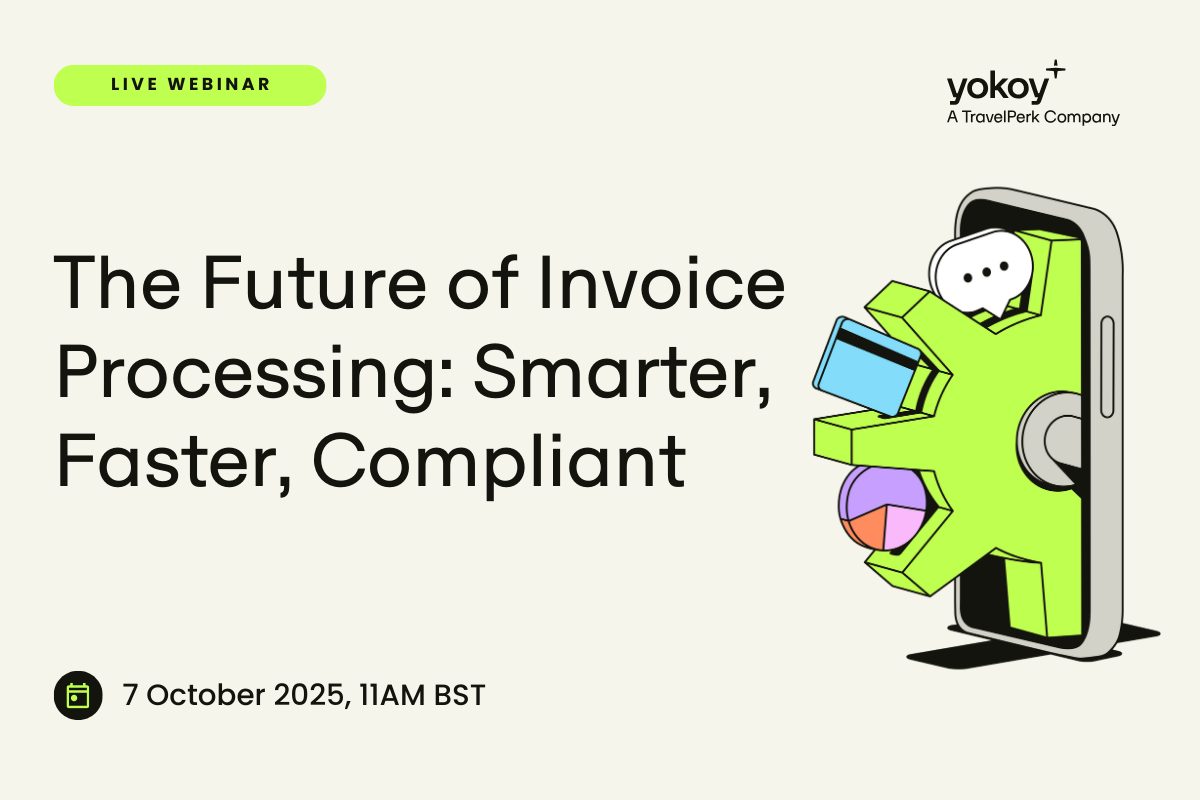Home / Regulations Are Changing: Is Your T&E Policy Ready?
Regulations Are Changing: Is Your T&E Policy Ready?
- Last updated:
- Blog

If your travel and expense policy was last updated during the days of paper receipts and spreadsheet claims, this is your wake-up call. New regulations across the EU and UK are shaking up how businesses handle everything from mileage allowances to carbon tracking.
We’re not just talking about tweaking a few rates or adding a footnote to your reimbursement policy. The arrival of frameworks like the Corporate Sustainability Reporting Directive (CSRD) and the Digital Operational Resilience Act (DORA) signals a significant shift in how organisations approach travel and expense (T&E) compliance. Mandatory digital receipts, real-time auditability, updated per diems, and ESG-aligned reporting come to mind that are baked into your travel policy.
For finance teams and CFOs, this is a strategic moment. Fail to adapt, and you’re risking audit headaches, regulatory penalties, and a lot of non-compliance stress. But get ahead of the curve, and you can streamline your T&E policy, reduce manual errors, and turn regulatory demands into operational wins.
How do you future-proof your T&E policy without getting buried in bureaucracy? Can modern technology help you to get a head start? Let’s find out!
What’s changing in T&E regulation
For finance teams across the UK and Europe, T&E policy updates are no longer optional: They’re an essential part of progress. A wave of evolving legislation is reshaping how businesses handle business travel, expense management, and reimbursement processes, from stricter audit trails to sustainability-linked reporting requirements. Staying compliant now requires more than just a tidy expense report.
Whether your organisation manages employee travel across borders or oversees a complex network of corporate card spend, the shift towards digital, transparent, and standardised expense processes is accelerating.
CSRD (Corporate Sustainability Reporting Directive)
The Corporate Sustainability Reporting Directive (CSRD) is reshaping how organisations track and report travel spend, requiring businesses to disclose the carbon footprint of corporate travel. Every flight, train, car rental, and local journey now contributes to your sustainability reporting.
To stay compliant, companies must link expense categories to carbon tracking, using real-time data rather than manual estimates. Travel policies should include clear guidelines on low-emission choices, with built-in checks for non-compliance.
Failing to comply with CSRD risks regulatory penalties and damages credibility with investors and stakeholders.
DORA (Digital Operational Resilience Act)
Meanwhile, the Digital Operational Resilience Act (DORA) sets new standards for digital accountability in financial services, including T&E management. All expense claims must be auditable, secure, and digitally resilient.
Manual processes and scattered expense reports no longer suffice. DORA mandates real-time digital receipt capture, traceable reimbursement workflows, and automated policy enforcement to prevent errors and ensure finance audit readiness from end to end.
Local rules on per diems and meal allowances
Beyond EU-wide rules, local tax laws are evolving too. Across Europe and the UK, stricter per diem rates, tighter meal allowance definitions, and updated reimbursement criteria mean yesterday’s business expense may no longer qualify.
To stay compliant, organisations must align travel policies with local thresholds, define clear spending limits, and maintain consistent approval processes, especially for cross-border employee travel. Regular policy updates, staff training, and automated checks are essential to avoid errors, penalties, or delayed expense reimbursement.
Blog article
Efficient Travel Expense Management: Pre-Trip, On-Trip, and Post-Trip Recommendations
Learn how to track your travel expenses efficiently and improve your control over the T&E process with AI-powered travel and expense management software.

Lars Mangelsdorf,
Co-founder and CCO
What does this mean for your T&E policy?
With compliance demands rising and oversight becoming sharper, treating your T&E policy as a back-office formality is insufficient. Expense policies must align with modern regulations to avoid penalties, reduce manual errors, and maintain full policy compliance.
Expense policies must now address:
Mandatory receipt capture and digital formats: Paper receipts and manual uploads no longer meet compliance standards. Regulations now require digital formats with full traceability, making automated receipt capture essential for audit readiness and policy compliance.
Updated per diem and mileage rates: Outdated per diem and mileage allowances can lead to overpayment or reporting errors. Automated tools help keep rates current, ensuring fair reimbursement and compliance across regions.
Carbon tracking or ESG-related requirements: Under CSRD, your travel policy must track emissions from corporate travel. AI-powered systems link expense categories to carbon data, helping businesses meet ESG goals and reporting requirements.
Real-time documentation and auditability: Regulators expect real-time access to expense data and clear audit trails. Automation supports faster approvals and reliable audit readiness with fewer manual touchpoints.
Risks of non-compliance: Ignoring regulatory updates can result in penalties, reputational damage, and operational disruption. Automated, clearly enforced T&E policies help reduce risk and keep your business audit-ready.
Common gaps in outdated T&E policies
When a T&E policy falls behind current standards, the result is often non-compliance, overspending, and inefficiencies in expense management.
Common gaps include unclear definitions of reimbursable business expenses, outdated meal allowances and mileage rates, and inconsistent expense categories. These issues lead to delayed reimbursements, rejected claims, and increased audit risk.
Undefined approval processes and reliance on spreadsheets further limit visibility into travel spend, making compliance with frameworks like DORA increasingly difficult. Manual workflows increase the risk of duplicate entries and inconsistent enforcement of spending limits.
By implementing AI-powered expense management tools, organisations can automate checks, flag non-compliant claims in real time, and streamline the entire reimbursement process, all while improving control and ensuring full policy compliance.
How to future-proof your T&E Policy
An outdated expense policy can expose any business to risks, inefficiency, and missed opportunities, whether navigating the latest VAT rules, aligning with CSRD or DORA, or ensuring smooth internal operations.
Update policy frameworks based on jurisdiction
There’s no one-size-fits-all approach to expense management. Across Europe and the UK, rules on per diem rates, meal allowances, and tax-deductible travel expenses are constantly evolving. To stay compliant, organisations must tailor their expense policy to each jurisdiction.
Regular updates to local spending limits, mileage rates, and reimbursement rules help ensure employees follow clear guidelines wherever they travel. Tools with built-in localisation can simplify this process and reduce the risk of non-compliance, rejected claims, or audit issues while improving the overall reimbursement process and employee experience.
Integrate ESG and reporting requirements
As sustainability becomes a regulatory requirement, finance leaders must embed environmental accountability into the T&E policy. Under the Corporate Sustainability Reporting Directive (CSRD), businesses must report emissions from corporate travel, making carbon tracking a core part of expense management.
Capturing emissions at the point of spending, from airfare to ground transportation, ensures accurate ESG reporting and supports smarter travel choices. An ESG-aligned travel policy supports compliance and is committed to responsible, future-focused operations.
Automate compliance enforcement
To future-proof T&E management, automation must be built into the expense management tools themselves. Manual checks and approvals slow the reimbursement process, increase risk, and distract finance teams from strategic work.
Automated approval workflows, real-time receipt capture, and policy enforcement ensure consistent compliance without added friction. Out-of-policy claims are flagged instantly, streamlining decision-making and reducing errors.
This approach also speeds up processing, reduces fraud, and provides a clear digital audit trail.
Blog article
Automated Expense Reporting: Simplify Expense Tracking and Maximize Compliance
Automated expense reporting helps you simplify expense tracking, enforce compliance, and streamline your expense management workflows. See how it works.

Lars Mangelsdorf,
Co-founder and CCO
How AI supports policy compliance and scalability
AI-powered expense management software is a life-changing experience: Internal and external policies and regulations are checked and flagged automatically, evolving with every use. Whether verifying meal allowances, mileage rates, or enforcing pre-approval rules, AI helps ensure compliance with security checks. This reduces tedious manual work, improving accuracy.
Duplicate or non-compliant submissions, such as repeat charges or out-of-policy, are flagged instantly. This protects company money, speeds up reimbursements, and gives employees clear, immediate feedback.
For companies managing global teams, AI handles regional tax rules, travel management requirements, and spending patterns without manual input. It ensures policy consistency and regulatory compliance, from corporate credit cards used on business trips to cross-border travel costs, even in complex organisational structures.
With AI handling documentation and tracking policy changes, businesses gain the transparency and control needed to meet evolving standards. It’s a scalable solution that balances modern business needs with compliance, cost control, and what employees need to operate effectively, whether in the office or using a mobile app on the road.
How Yokoy helps you stay compliant
Yokoy offers a future-ready solution that transforms travel and expense policy management. Purpose-built for automation and scale, Yokoy’s AI-powered platform simplifies the complexity of modern T&E management, from business travel and reimbursement to expense categories and audit readiness.
AI-powered policy enforcement
Yokoy embeds AI-powered policy enforcement at every stage of the expense management process. By adding modern tools like corporate cards, spending limits can be enforced, per diem entitlements validated, or unallowed business expenses blocked: Yokoy applies your T&E policy in real time.
The platform automatically checks every transaction against internal rules and external tax regulations, significantly reducing human error and improving policy compliance. It also supports tailored rules or workflows for different teams, countries, and entities. This makes Yokoy ideal for your business if it operates across borders or has complex approval structures.
Real-time alerts
Yokoy provides real-time alerts for non-compliant spending, missing receipts, or claims that exceed defined thresholds. If an employee forgets to upload a receipt or selects an incorrect expense category, the system flags the issue immediately.
These instant notifications streamline the reimbursement process and guide your employees to make policy-compliant decisions at the point of spending. This reduces friction, increases accountability, and ensures clear guidelines are consistently followed. No more waiting until month-end to uncover outliers.
Support for travel expenses and international tax compliance
Yokoy is designed to handle the complexities of global business travel, including support for jurisdiction-specific per diem rules, multi-currency spend and mileage rates. Whether you’re reimbursing employees for car rentals in Germany or managing travel expenses in the UK, the platform adapts to local regulations and ensures accurate, compliant reporting.
The system also supports cross-border tax-deductible tracking and international tax compliance, helping finance teams meet reporting requirements and avoid penalties. Built-in localisation ensures your expense policy is enforced accurately, no matter where your employees travel.
Seamless integrations
Yokoy provides seamless integrations into leading travel booking platforms, ERP systems, and accounting software. This ensures that all spending data flows smoothly and accurately across your ecosystem.
This eliminates manual data transfers, reduces errors in expense claims, and improves visibility into your company’s total travel spend. It also enables end-to-end automation of expense reports, from booking and approvals to payment and reconciliation, all while maintaining audit-ready records.
Checklist: Is your T&E policy ready for 2025?
Updated for country-specific tax and per diem rules: Your expense policy should reflect the latest per diem rates, mileage allowances, and tax guidelines for each country your employees travel to, ensuring accurate and compliant reimbursement.
Includes ESG and sustainability guidelines: Align your travel policy with CSRD by including carbon tracking, preferred low-emission transport options, and ESG-aligned expense categories to support sustainability reporting.
Supports digital recordkeeping and auditability: All expense reports, receipts, and approval workflows should be digitally captured and stored, with full real-time visibility and audit trails that meet modern compliance standards.
Fully integrated with your travel and payment tools: Seamless connections between travel booking systems, corporate card programmes, and accounting platforms ensure consistency, reduce errors, and streamline T&E management.
Enforced automatically with minimal manual input: Leverage automation and AI to apply your T&E policy across all business expenses, automatically flagging non-compliant claims and guiding employees with clear guidelines at every step.
Next steps
Book a personalised demo to see how Yokoy can help you automate compliance, reduce manual errors, and stay ahead of 2025’s regulatory changes.
Book a demo today and take the first step towards smarter, scalable travel and expense management.
In this article
See intelligent spend management in action
Book a demoRelated content
If you enjoyed this article, you might find the resources below useful.


